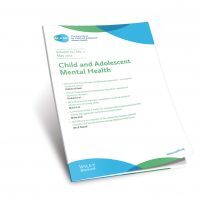Some highlights from our three journals JCPP, CAMH, and JCPP Advances. Each one of the posts below provides a link to read, and download the full paper.
Feature Papers
-

Review: Adverse event monitoring and reporting in studies of pediatric psychosocial interventions: a systematic review
Open Access paper from the CAMH journal – ‘In this systematic review, we identified how adverse events are defined, measured, and reported in studies of psychosocial interventions for children with mental disorders’. Kalee Lodewyk et al.
Read more -

Co-producing a complex psychosocial intervention during COVID-19 with young people transitioning from adolescent secure hospitals to adult services in England: MFi (Moving Forward intervention)
Open Access paper from the CAMH journal – ‘This paper delineates the process of developing and co-producing the moving forward intervention (MFi), which aims to address the psychosocial needs of transitioning youth who have limited access to well-researched and tailored service provisions’. Maria Livanou (pic) et al.
Read more -

4STMF (Four Steps To My Future): acceptability, feasibility and exploratory outcomes of a universal school-based mental health and well-being programme, delivered to young adolescents in South Africa
Open Access paper from the CAMH journal – ‘Mental health disorders affect many children in South Africa, where vulnerability is high, and treatment is limited. We sought to determine the feasibility and acceptability of a universally delivered classroom-based programme for the promotion of mental health in young adolescents.’ Bronwynè Coetzee (pic) et al.
Read more -

Debate: Neurodiversity, autism and healthcare
Open Access paper from the CAMH journal – ‘I discuss current different uses of the term autism, the relation to intellectual disability, and introduce a conceptualisation of autism as emergent and transactional, which is consistent with current developmental and intervention science. This could bridge between neurodiversity and clinical perspectives and implies a framing of early intervention support that has strong clinical trials evidence and provides the basis for a rational and pre-emptive evidenced care pathway, which I describe.’ Jonathan Green (pic).
Read more -

Annual Research Review: Early intervention viewed through the lens of developmental neuroscience
Open Access paper from the JCPP – ‘The overarching goal of this paper is to examine the efficacy of early intervention when viewed through the lens of developmental neuroscience. […] We conclude our article by discussing the implications our review has for policy, and we then offer recommendations for future research’. Charles A. Nelson et al.
Read more -

The role of sleep in prospective associations between parent reported youth screen media activity and behavioral health
Paper from the CAMH journal – ‘We examined whether sleep mediated the association between screen media activity and youth behavioral health among a community sample’. Darlynn M. Rojo-Wissar (pic) et al.
Read more -

Technology Matters: Online, self-help single session interventions could expand current provision, improving early access to help for young people with depression symptoms, including minority groups
Open Access paper from the CAMH journal – ‘Current mental health service provision for young people was primarily designed based on an assumption of repeat attendance to enable access to interventions. This applies to in-person therapy and, in recent years, digitally provided apps and programmes. Yet, discontinuation after only one or two attendances or uses is a common problem. However, there is a different model, which is intentionally designing provision without assuming repeat attendance, that is, single session interventions.’ Maria E. Loades (pic) and Jessica L. Schleider
Read more -

A twin study of genetic and environmental contributions to ADHD (Attention-Deficit/Hyperactivity Disorder) over time
Open Access paper from the JCPP – ‘We investigated whether the genetic and environmental variance underlying ADHD, and traits of ADHD, has changed over time’. Mark J. Taylor (pic) et al.
Read more -

Children with maltreatment exposure exhibit rumination-like spontaneous thought patterns: association with symptoms of depression, subcallosal cingulate cortex thickness, and cortisol levels
Open Access paper from the JCPP – ‘We studied the impact of maltreatment on self-generated thought (SGT) patterns and their association with depressive symptoms, subcallosal cingulate cortex (SCC) thickness, and cortisol levels in children.’ Ferdinand Hoffmann et al.
Read more -

Do single-case experimental designs lead to randomised controlled trials of cognitive behavioural therapy interventions for adolescent anxiety and related disorders recommended in the National Institute of Clinical Excellence guidelines? A systematic review
Open Access paper from JCPP Advances – ‘The primary purpose of this review was to investigate whether Single-case experimental designs (SCEDs) are currently followed by randomised controlled trials (RCTs) of cognitive behavioural therapy (CBT) intervention for adolescent anxiety disorders named in the NICE guidelines’. Tom Cawthorne et al.
Read more